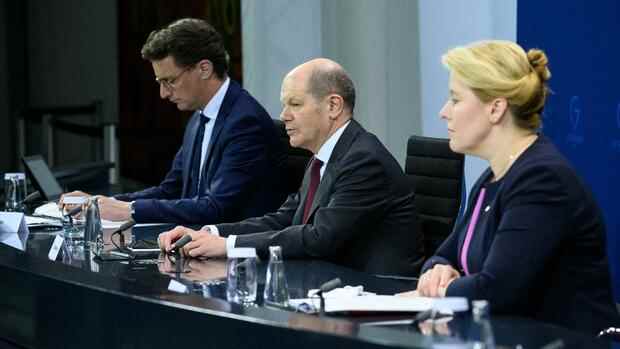The federal and state governments have agreed on a division of the refugee costs.
(Photo: dpa)
Berlin The federal government makes a lot of concessions to the states when it comes to covering the refugee costs. Refugees from Ukraine are to be given financial support in the same way as recognized asylum seekers. This means that they receive the same benefits as, for example, Hartz IV recipients. This was announced by Brandenburg’s Prime Minister Dietmar Woidke (SPD) late Thursday evening after hours of negotiations between the federal and state governments.
Equality with Hartz IV recipients has advantages for war refugees: they receive higher benefits and better health care. They also receive earlier support for integration into the labor market and have a central point of contact with the job centers.
The municipalities had also campaigned for this solution because the federal government bears the expenses for basic security. According to the compromise that has now been reached, according to Chancellor Olaf Scholz (SPD), the federal government will also support the municipalities with the costs of accommodating the refugees in the current year with 500 million euros. “The agreement is a good basis for our country to stand together in the long term,” said the Chancellor.
>> More on the topic: Dispute over refugee costs: “The prime ministers are at 180”
Top jobs of the day
Find the best jobs now and
be notified by email.
The federal states had already demanded binding commitments from the federal government for the financing of accommodation, food, health care and care for refugees and displaced persons from Ukraine. Among other things, the federal states wanted money for the provision of childcare and education places as well as for housing costs. The meeting had already started in the afternoon with a one-hour delay, since the country heads needed to talk to each other far more than initially planned.
In the end, the countries received far-reaching commitments. The federal government will contribute 500 million euros to the costs already incurred in the federal states in the current year. The federal government wants to contribute one billion euros to the costs of integration in day care centers or schools. According to the Chancellor, a total of two billion euros will be made available to the federal states.
At their conference on March 17, the federal and state governments had already agreed in principle that taking in war refugees would be a joint task. A working group should prepare a decision on the question of costs by April 7th. It has to be decided whether Ukraine refugees should receive benefits under the Asylum Seekers Benefits Act or basic security.
The European Union has decided to activate the so-called mass influx directive for the first time in order to take in war refugees from Ukraine. This stipulates that those seeking protection do not have to apply for asylum, but first receive a residence permit for one year and are allowed to work. An extension of up to three years is possible.
The number of Ukraine refugees in Germany is well over 300,000. According to the Federal Ministry of the Interior, the Federal Police alone has recorded 316,453 so far. However, Ukrainians can enter without a visa, so the actual number of those seeking protection is likely to be higher. The federal police are currently detecting the entry of around 3,000 people from Ukraine every day. In March, the number of new arrivals was over 15,000 per day.
More: Chancellor Olaf Scholz and the country heads are discussing cost sharing for the care of refugees today. The federal states are demanding billions, the federal government is reacting with reservations.
With agency material.
